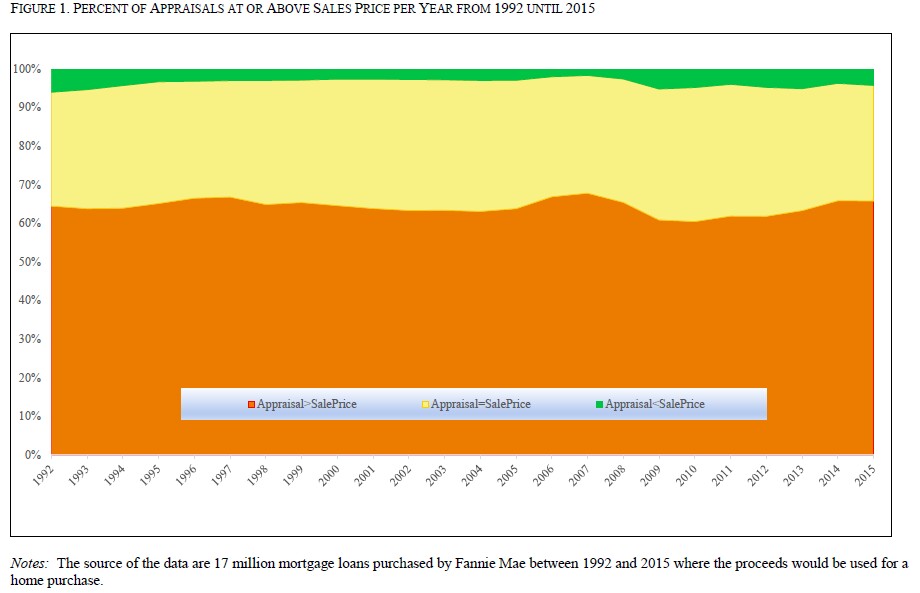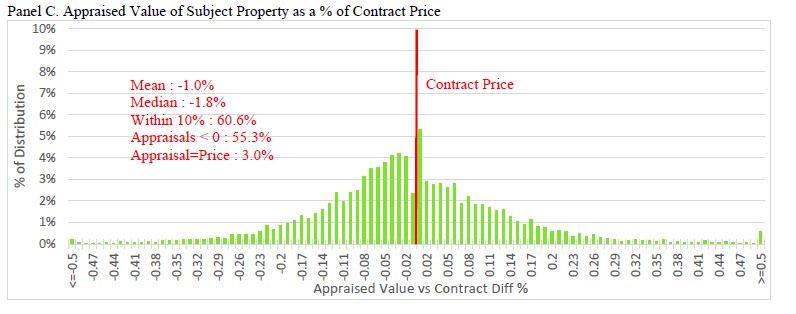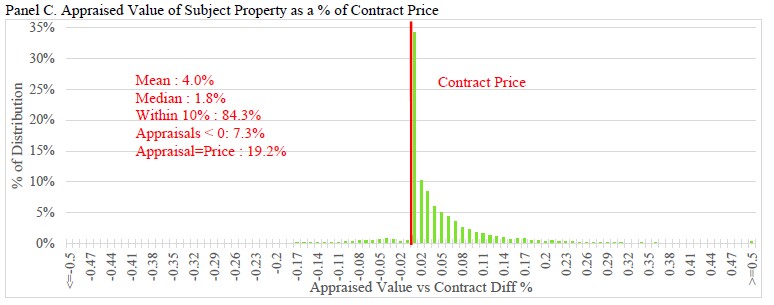3 1/2 years ago I wrote a blog post about some of our worst experiences with real estate appraisals and some of the systematic problems with that entire process. Needless to say that post was not well received by many real estate appraisers out there. Not surprisingly, they wouldn’t really admit to any problems in their profession but they were certain that I was an idiot.
That’s why I was greatly amused recently by some appraisal data that I ran across thanks to John Wake at Real Estate Decoded. A study was done a couple of years ago by a couple of Fannie Mae guys in conjunction with an academic type, a summary of which appears here: Opportunities to Improve the Value of Appraisals. The bottom line is that appraisers are biased by the contract price and 90% of the time they come in at or above the contract price. Almost as shocking as gambling going on in Casablanca.
Here is a graph that shows the distribution of appraised values over time relative to contract price. As you can see, more than 60% of the time the appraisal comes in above the contract price and about 30% of the time it comes in exactly at the contract price. So either the contract price biases the appraisers or sellers are getting screwed 60% of the time. Yeah, you guess which it is.
To put the entire matter in an even clearer perspective the researchers were able to actually measure the impact of knowing the contract price on the appraisal by looking at a group of foreclosed properties that were appraised twice in a six month period – once after Fannie Mae acquired the property and then again later when it was under contract. What they found was that knowing the contract price essentially raised the appraised value by about 5.7% – a significant amount.
Looking at a distribution of the percent differences between pre-contract appraised value and contract price you see a fairly normally distributed set of values, which on average comes in 1.0% below the contract price.
However, when the appraisal is done a few months later on the exact same group of homes with knowledge of the contract price that distribution of differences becomes heavily skewed, averaging 4.0% higher than the contract price (yeah, I don’t know why it only shows a 5.0% increase from the pre-contract average when they claimed it was 5.7% higher).
It seems to me that the simple solution is to not tell the appraiser what the contract price is – and that is in fact one of the possibilities suggested in that Fannie Mae article I linked to above. Of course, can you imagine what kind of hell would break loose if half of all homes appraised below the contract price? Maybe there’s a good, practical, reason for showing the appraiser what number “they need to hit”.
In the meantime, this whole story basically reinforces my belief that these appraisals are a crap shoot. Obviously you shouldn’t count on them to save you from overpaying for a home. In fact, according to these appraisers you’re getting a deal.
#RealEstateAppraisals
Gary Lucido is the President of Lucid Realty, the Chicago area’s full service discount real estate brokerage. If you want to keep up to date on the Chicago real estate market, get an insider’s view of the seamy underbelly of the real estate industry, or you just think he’s the next Kurt Vonnegut you can Subscribe to Getting Real by Email using the form below. Please be sure to verify your email address when you receive the verification notice.



